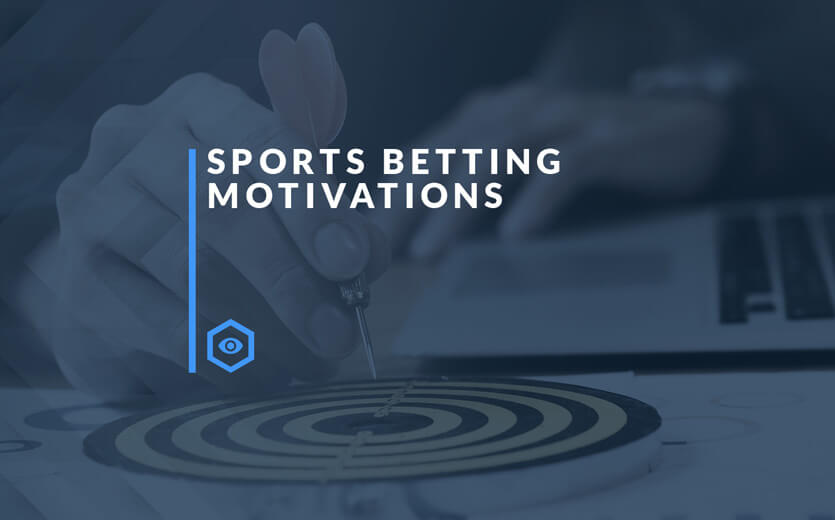Psychology Of Sports Gambling
Psychology of sports betting is one of the most important features of success in sports betting. Look at the most common distortions
23/09/2019

Sports Betting and the Psychology Behind It Sports betting is a fun pastime that has been around for hundreds of years and Kiwis are huge fans. It is regulated under laws in various regions of New Zealand to help curb irresponsible sports betting within illegal environments and even though some fall prey to the addiction, the thrills of sports. In his book Squares & Sharps, Suckers & Sharks: The Science, Psychology & Philosophy of Gambling, Joseph Buchdahl, betting analyst expert, Pinnacle author and owner of the results and betting odds data archive Football-Data.co.uk, takes you on a journey to find out what motivates people to gamble and how their cognitive biases can lead them to. These findings draw attention to the new research field of professional video game playing and provides some preliminary insight into the psychology of esports players. The paper also examines the similarities between esport players and professional gamblers (and more specifically poker players). Steering clear of places and situations where sports gambling takes place can be a good idea. A popular treatment of gambling addiction is cognitive behavioral therapy (CBT), which is administered by a therapist. Fans seeking uncertainty find the drama and randomness of the sports outcome a compelling attraction and a reason to invest money, time and energy in being a spectator (which also partially explains the excitement many fans have for gambling and fantasy sports).
My personal psychological goal for sports betting goes like this:

You can indeed set your own goal, but let's pretend for a minute you agree with the one I set. How do you know you have reached that goal? When you created emotional distance and watch the game only through the eyes of pure chance and probability, you are there.
You don’t play the “would be nice/fair for them to win” mental game anymore and follow your football betting strategy.
On the way to reach the goal there are some, often very well hidden psychological distortions that might and will come across. Now let us look at the tricks that your mind plays with you.
You get the feeling you are a great bettor
Pride comes before a fall. Have you ever heard this statement before? Some of you could have experienced it the hard way. This is often the case if you are having a period of good results. Not seeing this as a matter of luck, you are getting self confident without any good reason.
The good period makes you feel happy but guess what. You are prone to risk more if you are happy! There is a study on betting and happiness supporting this statement. I am not trying to put the good ones among you down, but try to be honest and answer the following question just for you.
Are your betting skills really so great? Is there anything special about your betting know-how that gives you a long term advantage, or do you see luck as your skills? Try to answer this honestly using facts only!
Please look at the following Ted Talks video which might give you some more insight to this topic.
Confirmation bias
...makes you ignore what you should pay attention to. Confirmation bias is about ignoring a clear evidence. You see obscure signs that the chances for the match results are different than your prediction, but you simply ignore them.
The main problem is that we would rather seek the evidence that supports our point of view instead of being critical. We are prone to ignore the bad news. There is some more about cognitive biases in the following video. They are certainly useful in sports betting as well.
Cognitive distortion
We all have a tendency to look at what happened in the past through the eyes of today's knowledge. A very good example is the boxing fight between Antony Joshua and Andy Ruiz. Online bookies favored AJ with 78% (decimal odds 1.28) and the underdog Ruiz chances were supposed to be only 26,6% (decimal odds 3.75). Most of the punters (including me) were basically the same opinion. I even considered the odds on Joshua’s win too high as Ruiz was supposed to be just the journey-man for AJ.
The arguments were supporting it:
- AJ never looked so strong as he did before this fight
- He trained really hard
- He is humble and respectful
- On the weigh in I just couldn’t take Ruiz seriously / talking about the aesthetic of how a sportsmen 'should' look like
For those who watched the fight, this was a blow of surprise. From my point of view (and from the point of view of many boxing experts), AJ had no chance. This was not about Ruiz using his 26% of a chance to win the fight. This was about the chances being predicted completely wrong by the bookies. From what I think, AJ had only a chance to win by some accidental suckers blow. I see it as 10% AJ win and 90% Ruiz win.
And coming to the point. I sound so smart now, right! Now it is more than obvious that AJ was 2 levels below Ruiz. Now we hear many experts saying “AJ should lose 2 stones, to be quicker”. “Boxing is about being fast and not looking like an armored tank”... Because everybody is smart now...
This is called cognitive distortion. As we have knowledge about the results of the past event, now it is easy to find arguments supporting it. The crucial thing is to find them before the match. The cruel truth in this case was: I don't really know anything about boxing (watching every now and then doesn't count), I had no sports prediction tools quantifying my feelings and my bet was a great example of how NOT to do it.
You ask a good question
...but end up answering the wrong one. Let me explain this with an example. You are trying to guess the result of the match between Barcelona and Roma.
This might be really a good example since most of the punters know FC Barcelona even in detail and many have heard of AS Roma. So what would you do after you decide, this might be a good match to bet on? You most likely look at some past results of both teams and then just answer like this “I know FC Barcelona much better and think they have a good chance to win, so I will bet on them”.
Many times the following scenario happens. The original question “How the match will end” ends up with an answer “I know this one or that one team better and I will bet on them”. Try to observe this mental process and whenever you see in your mind something like “Not sure from my analysis and betting model who will be the winner, but I know the team X better, so I will bet on that”.
This match was by the way played in August 2018 and AS Roma and ended up winning with the score 2:4.
Psychology Behind Sports Gambling
So what is the right answer supposed to be?
It should sound like this:
I did a deep analysis of both teams, results in leagues, I checked the shape of players and the news. Then I compared the odds coming out of my football betting model with the odds from the online bookmakers.
You see the real odds being pushed towards the statistical chance by e.g. 30% in favour of FC Barcelona. This is the chance to bet like a bot, since a value bet has been discovered.
Time consuming? Indeed, but keep in mind that you are competing against dedicated teams of professionals. Besides that, we are offering you our football predictions, where we do the time consuming job for you. You can also use our calculator to create your own football odds. The second option is more time consuming, but the process is fully in your hands.
Latest Posts
Editor's Picks
What is sport betting?
A pool of people gambling on the outcome of a sport event such as football, basketball, baseball, hockey, boxing, horse racing and more. Sports gambling is illegal unless is regulated, approved venue. Some people more prefer to go through USA casinos and make some fun, but sports betting is something different and we can’t say the casino can go in that group.
Why do people gamble?
Psychology Of Sports Gambling Research
– The excitement, a high adrenaline release.
– Competitive element, a desire to beat other players, a bookie, the dealer or the casino.
– The thrill asscoiated with the risk of placing large bets.
– To make money to solve financial problems.
– A distraction from stress or worry.
Who’s betting?
Gender
– Men are nearly twice as likely to gamble on sports.
Age
26% – 18-24 year olds
18% – 35-45 year olds
11% – 55 +
Income
6% – Lower-income households (annual household income of $30k or less).
17% – Middle-income households (annual household income of $35k-$75k or less).
28% – Households with $75k+ income.
Education
– College graduates (24%) are much more likely to gamble on sports than non-graduate (14%).
Potential dangers of Sport Betting
Gambler’s Fallacy (aka. Monte-Carlo Fallacy)
– The mistake belief that after a series of more-frequent-than-normal results (like a repeated results of “heads” when flipping a coin), the opposite result must happen soon. This is incorrect, since the odds for a result are the same every time (the odds of getting “tails” when flipping a coin is always 50/50).
Gambling Addiction
– An estimated 2-3% of Americans suffer from a gambling addiction.
– People in the USA spend $5 BILLION annually on gambling activities, according to study.
– Approximately 6% of American college students grapple with gambling addiction.
– Clinical studies show that sports betting has a higher addiction potential than playing the lottery.
– Approximately 750,000 people aged 14-21 have a gambling addiction.
– The families of those suffering from gambling addiction are more likely to experience domestic violence.
Gambling and Mental Illness
– People with a gambling addiction posses higher likelihood of developing a mental health disorder.
– Post-traumatic stress disorder (PTSD) symptoms affect 12.5 – 29% of gamblers addicts.
– 34% of gambling addicts who seek treatment express symptoms of PTSD.
– People affected by alcohol use disorders have 23% higher likelihood of developing a gambling addiction.
– Research by the University of North Carolina Greensboro states there’s higher incidence of the following in gambling addicts:
– Depression disorders
– Anxiety disorders
– Substance abuse disorders
– Anti-social pesonality disorders.
Treatment of Gambling Addiction
– SEEK SUPPORT: Whether through a professional psychologist, friend or relative, talking about the problem is the first step.
– AVOID TEMPTATIONS: Steer clear of places and situations that make it tempting to gamble.
– PSYCHOTHERAPY: Behavioral therapy or cognitive behavioral therapy (CBT) can be used to help change the behaviors and thinking behind a gambling compulsion.
– MEDICATION: Antidepressants or mood stabilizers can be used to treat the symptoms associated with gambling addiction (depression, obsessive-compulsion disorder or attention deficit hyperactive disorder).